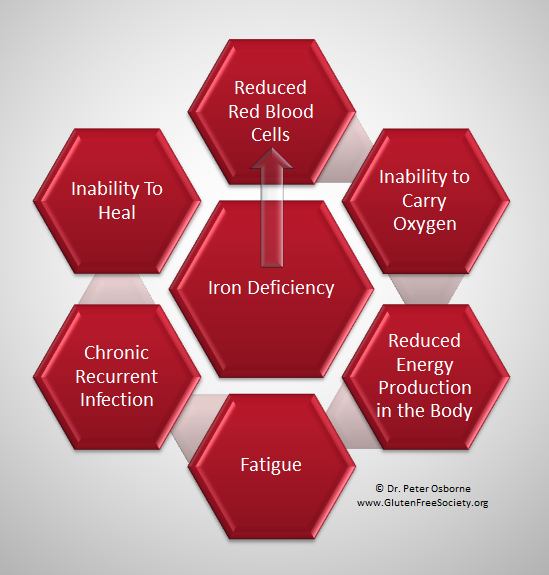Iron is incredibly important mineral and is found in every living cell so I thought I'd write a short post on the importance of iron as mineral as well as the signs of being iron deficient can lead to.
Why Do We Need Iron?
Iron is necessary for human life. Its importance lies in the haemoglobin molecule of red blood cells where it functions in transporting oxygen.
Iron deficiency results in impaired delivery of oxygen to tissues and impaired activity of iron containing enzymes.
Iron deficiency may be caused by
Iron deficiency can lead to

Image Credit: Gluten Free Society
What does iron do?
So, we've talked about the symptoms of being iron deficient but what does iron contribute to and how does it help your body continue to run smoothly?
Contributes to normal oxygen transport in the body.
It does this by forming haemoglobin in the blood whose function is to carry oxygen from the lungs through the arteries to the tissues and carry carbon dioxide back through the veins to the lungs.
Contributes to normal formation of red blood cells and haemoglobin
Iron is carried in the blood to the bone marrow where red blood cells are produced. It is then combined with proteins to form haemoglobin, the protein that carries oxygen. Iron that does not get used is stored in the bone marrow and liver. Iron deficiency results in diminished production of haemoglobin. The red blood cells then become small (microcytic anaemia), and cannot carry enough oxygen for the body’s needs
Contributes to normal cognitive function
If the brain does not receive enough oxygen due to the oxygen carrying capacity of the red blood cells being diminished then mental performance is altered. Processing speed and the accuracy of cognitive function over a broad range of tasks is altered.
Contributes to normal energy yielding metabolism and the reduction of tiredness and fatigue
Oxygen is needed for respiration in the cells. Without enough oxygen, cells cannot produce enough energy leading to tiredness and fatigue. When the blood in the capillaries reaches the body tissues, oxygen is freed from the haemoglobin and if there is not enough haemoglobin then there is not enough oxygen . Iron plays a role in oxygen transfer to cytochromes, protein molecules involved in the production of energy in cells.
Contributes to the normal function of the immune system
Cells of the immune system, monocytes, macrophages, microglia and lymphocytes are able to combat bacteria by controlling their iron fluxes. Also, other molecules that are iron dependent can orchestrate the inflammatory response by mobilising cytokines and reactive oxygen species.
Plays a role in the process of cell division
Iron is needed for the enzyme ribonucleotide reductase that is involved in DNA synthesis. Not only is there a nutritional requirement of proliferating cells for iron but iron also appears to play some kind of ‘signaling’ role in the cell cycle.
Iron contributes to the normal cognitive development of children
Studies in human infants suggest that iron deficiency in early life has multiple effects on the chemistry and biology of the brain and nervous system. These studies suggest that this is an irreversible effect, so stressing the importance of iron during pregnancy for the developing baby.
Other nutrients related to iron function
It is worth remembering that the normal transport of iron also relies on adequate bodily copper supplies and that riboflavin 5 phosphate (vitamin B2) contribute to the normal metabolism of iron.
Vitamin A also contributes to normal iron metabolism and Vitamin C increases iron a
No comments:
Post a Comment